PMP® Certification Training: Unlocking the Key to Leadership in Project Management
By Ryan Cezar Malaluan CAPM®; Editor: Geram Lompon; Reviewed by: Alvin Villanueva, PMP®
Why Leadership in Project Management Matters
Picture this: You’re leading a high-profile project, juggling tight deadlines, shifting priorities, stakeholder expectations, and a team struggling to stay aligned. Despite your best efforts, unexpected challenges arise—such as budget overruns, resource shortages, or scope creep—pushing your problem-solving skills to the limit. The pressure mounts, tensions rise, and all eyes turn to you. In this moment, the difference between success and failure hinges on your ability to lead with confidence, clarity, and adaptability.
Project management is more than just meeting deadlines—it’s about strategic leadership, risk management,
This is where a PMP® certification training course comes in. It’s not just a credential; it’s a structured approach to developing the leadership mindset, technical expertise, and decision-making skills that drive projects to success.
In this article, we’ll explore how PMP® certification enhances leadership in
PMP® Certification: Understanding Its Value in Leadership
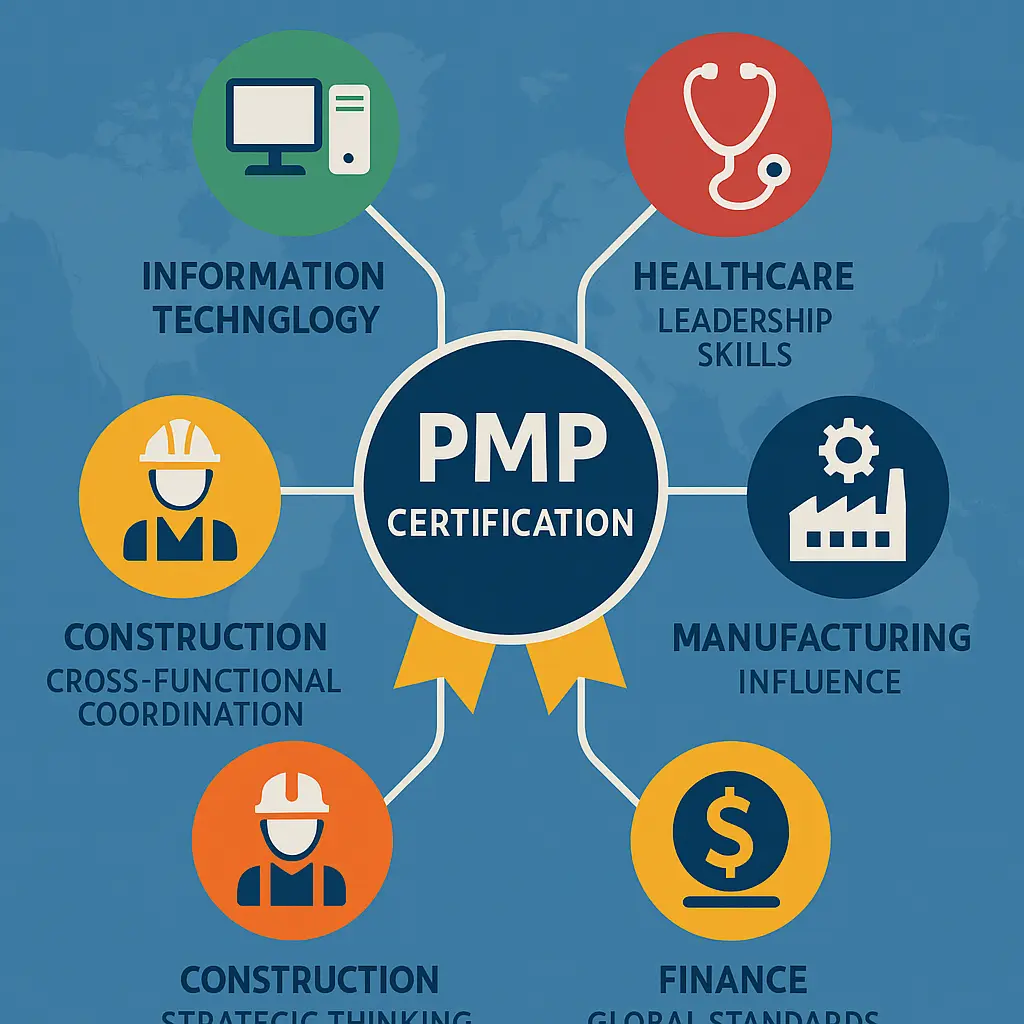
Defining PMP® Certification
The
With businesses increasingly demanding agile and adaptable leadership, PMP® certification equips professionals with a globally recognized framework for delivering projects on time, within scope, and on budget. Whether you’re managing complex IT implementations, overseeing large-scale construction projects, or leading innovative product launches, PMP certification ensures you have the tools, techniques, and leadership mindset needed to navigate challenges effectively.
How PMP® Stands Out Among Other Certifications
There are many project management certifications available, but PMP® holds a unique position due to its comprehensive coverage of
PMP® also emphasizes leadership development, teaching project managers how to align projects with business objectives, proactively mitigate risks, and foster effective team collaboration. By understanding PMP principles, professionals can seamlessly adapt to various work environments, whether in IT, healthcare, engineering, finance, or other fields.
If you’re considering expanding your skill set beyond PMP®, you can explore additional training and certification programs that align with your long-term career goals.
Common Misconceptions About PMP®
Despite its widespread recognition, PMP® certification is often misunderstood. Here are some common myths:
- “It’s only relevant for IT professionals.” False—While PMP® is highly regarded in IT, it is equally valuable in industries like construction, healthcare, finance, government, and engineering, where structured
project management is critical (PMI, n.d.). - “It’s all about memorizing concepts.” The PMP® exam does not rely on rote memorization; instead, it evaluates real-world application through scenario-based questions, testing how candidates would respond to actual project challenges (PMI, n.d.).
- “Experience isn’t necessary.” Unlike entry-level certifications, PMP® requires substantial
project management experience to qualify. Candidates must demonstrate years of hands-on project leadership before being eligible to sit for the exam (PMI, n.d.).
With these misconceptions addressed, let’s explore how PMP® certification transforms professionals into effective leaders, empowering them with the skills, confidence, and strategic insight to drive success in any project environment.
How PMP® Certification Strengthens Leadership in Project Management
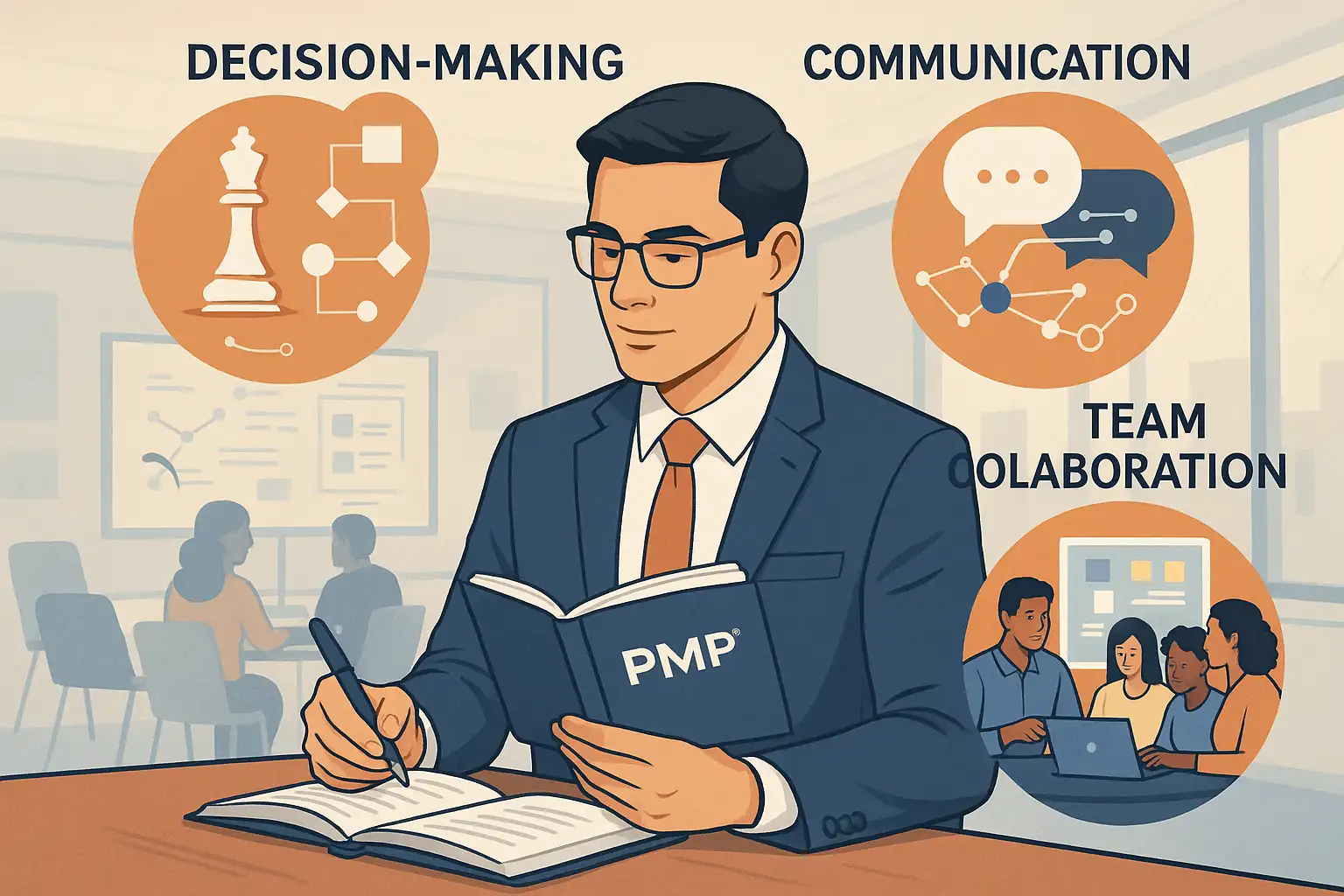
Becoming PMP®-Certified: Developing the Leadership Mindset
Earning a PMP® certification isn’t just about understanding processes—it’s about developing the mindset and skills of a strong leader. Successful project managers don’t just follow methodologies; they inspire teams, navigate uncertainty, and make strategic decisions that drive business success. PMP® training enhances leadership in several key ways:
1. Sharpening Decision-Making and Problem-Solving Skills
In the fast-paced world of project management, split-second decisions can determine a project’s success or failure. PMP® training emphasizes risk assessment, strategic thinking, and scenario planning, helping professionals anticipate challenges before they escalate.
For instance, instead of merely reacting to budget constraints or resource shortages, PMP®-certified managers proactively assess risks, identify alternative solutions, and implement contingency plans. This structured approach reduces project disruptions and fosters a culture of problem-solving within teams.
Moreover, PMP® training teaches professionals how to analyze project data effectively, enabling them to make data-driven decisions rather than relying on guesswork. This ensures that every choice aligns with business goals, maximizing efficiency, cost-effectiveness, and project success.
2. Strengthening Communication and Team Collaboration
Successful projects don’t just rely on technical expertise—they thrive on clear communication and strong teamwork. A project manager must bridge gaps between stakeholders, resolve conflicts, and keep teams aligned to ensure smooth execution.
PMP® certification provides structured training on effective communication strategies, a vital component for succeeding in the PMP® certification exam, emphasizing how to:
- Align stakeholders with project goals – Ensuring that everyone, from executives to team members, shares a common vision and understands the project’s objectives, scope, and impact.
- Resolve conflicts efficiently – Conflicts are inevitable, but PMP® training equips managers with negotiation techniques and conflict resolution frameworks to foster collaboration rather than discord.
- Keep teams motivated and engaged – A high-performing team isn’t just skilled; it’s inspired. PMP®-certified leaders learn how to set clear expectations, provide constructive feedback, and create a supportive work environment that boosts productivity.
In essence, PMP® training transforms managers into effective communicators and relationship-builders, ensuring that teams work cohesively toward project success.
3. Developing Strategic Leadership Abilities
Great project managers do more than execute tasks—they align projects with broader business objectives to drive long-term value. PMP® certification instills a big-picture perspective, teaching professionals how to:
- Prioritize initiatives based on business impact.
- Optimize resources to maximize ROI
- Adapt project strategies to changing market conditions
This strategic mindset enables organizations to achieve sustainable growth, rather than merely completing projects on time.
Real-World Impact: The Numbers Speak for Themselves
The benefits of PMP® certification aren’t just theoretical—real-world data backs them. According to a PMI® Pulse of the Profession report, companies with PMP®-certified project managers experience a 25% increase in project success rates. This highlights how PMP® training enhances leadership, improves efficiency, and minimizes costly project failures.
By learning both the technical and leadership aspects of
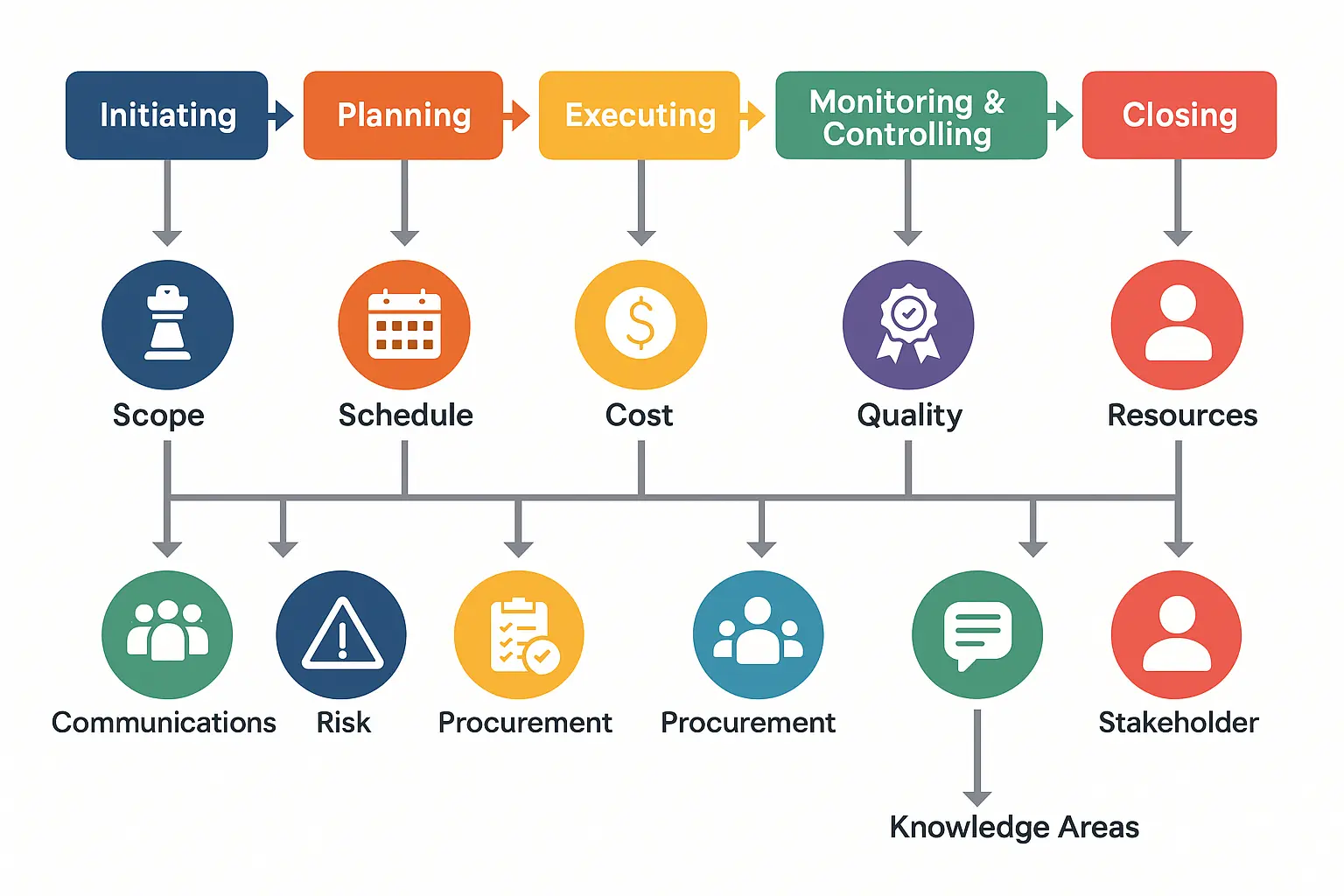
The Core Components of PMP® Certification Training
Becoming PMP®-certified isn’t just about passing an exam—it’s about embodying a comprehensive framework for managing projects effectively. At the heart of PMP® training is the
PMP® certification training is structured around five key process groups and ten essential knowledge areas, enabling professionals to develop a comprehensive understanding of
The Five Process Groups in Project Management
These process groups represent the lifespan of a project, from inception to completion:
- Initiating – Defining project goals, identifying key stakeholders, and determining feasibility. This phase lays the foundation for success by aligning expectations and securing approvals.
- Planning – Developing a detailed roadmap, including the project scope, schedule, budget, risk assessment, and resource allocation. Effective planning minimizes uncertainty and sets clear performance benchmarks.
- Executing – Managing teams, workflows, and deliverables to ensure the project stays on track. This phase requires strong leadership, stakeholder communication, and adaptability to unforeseen challenges.
- Monitoring & Controlling – Tracking project progress against the plan, identifying deviations, mitigating risks, and making necessary adjustments to ensure quality and efficiency.
- Closing – Conducting final evaluations, documenting lessons learned, and ensuring all project requirements have been met before official completion.
Key Knowledge Areas Covered in PMP® Training
In addition to the process groups, PMP® training delves into ten core knowledge areas that enhance a project manager’s ability to lead efficiently:
- Risk Management – Identifying potential risks early and implementing mitigation strategies to minimize disruptions and minimize their impact.
- Stakeholder Communication – Ensuring clear, transparent, and effective collaboration among teams, executives, and clients.
- Resource Management – Optimizing time, budget, and personnel to maximize productivity and project success.
- Quality Control – Maintaining high project standards through continuous monitoring and performance assessment.
Why Understanding These Components Matters
Understanding these components doesn’t just help professionals pass the PMP® exam—it equips them with structured methodologies to manage projects with greater efficiency, reduce risks, and enhance overall success rates.
PMP® certification bridges the gap between theory and real-world application, enabling project managers to lead with confidence, adapt to challenges, and drive impactful results.
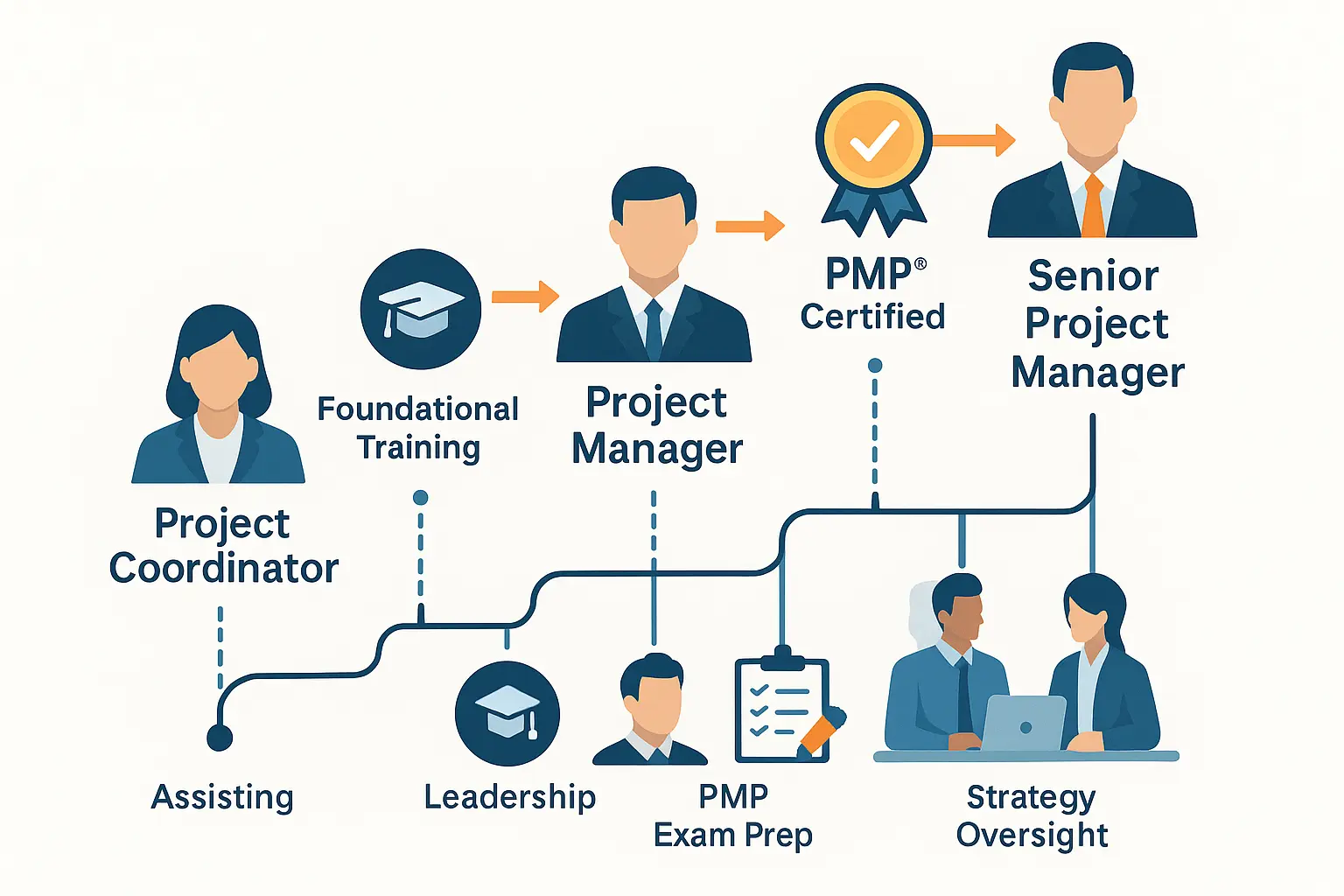
Who Should Pursue PMP® Certification? Is It Right for You?
PMP® certification is ideal for experienced project managers and professionals in leadership roles looking to advance their careers.
Industries That Benefit from PMP®:
- IT & Software Development: Managing complex Agile or hybrid projects.
- Construction & Engineering: Overseeing large-scale infrastructure projects.
- Healthcare & Pharmaceuticals: Managing research and compliance-heavy projects.
- Finance & Banking: Handling risk-intensive financial initiatives.
Career Growth and Salary Potential
A PMI® Salary Survey reveals that PMP®-certified professionals earn 32% more on average than their non-certified peers, proving that this credential significantly enhances earning potential and career progression.
If you have three to five years of project experience and seek to refine your leadership skills, PMP® certification is a powerful step forward.
How to Prepare for PMP® Certification: A Step-by-Step Guide
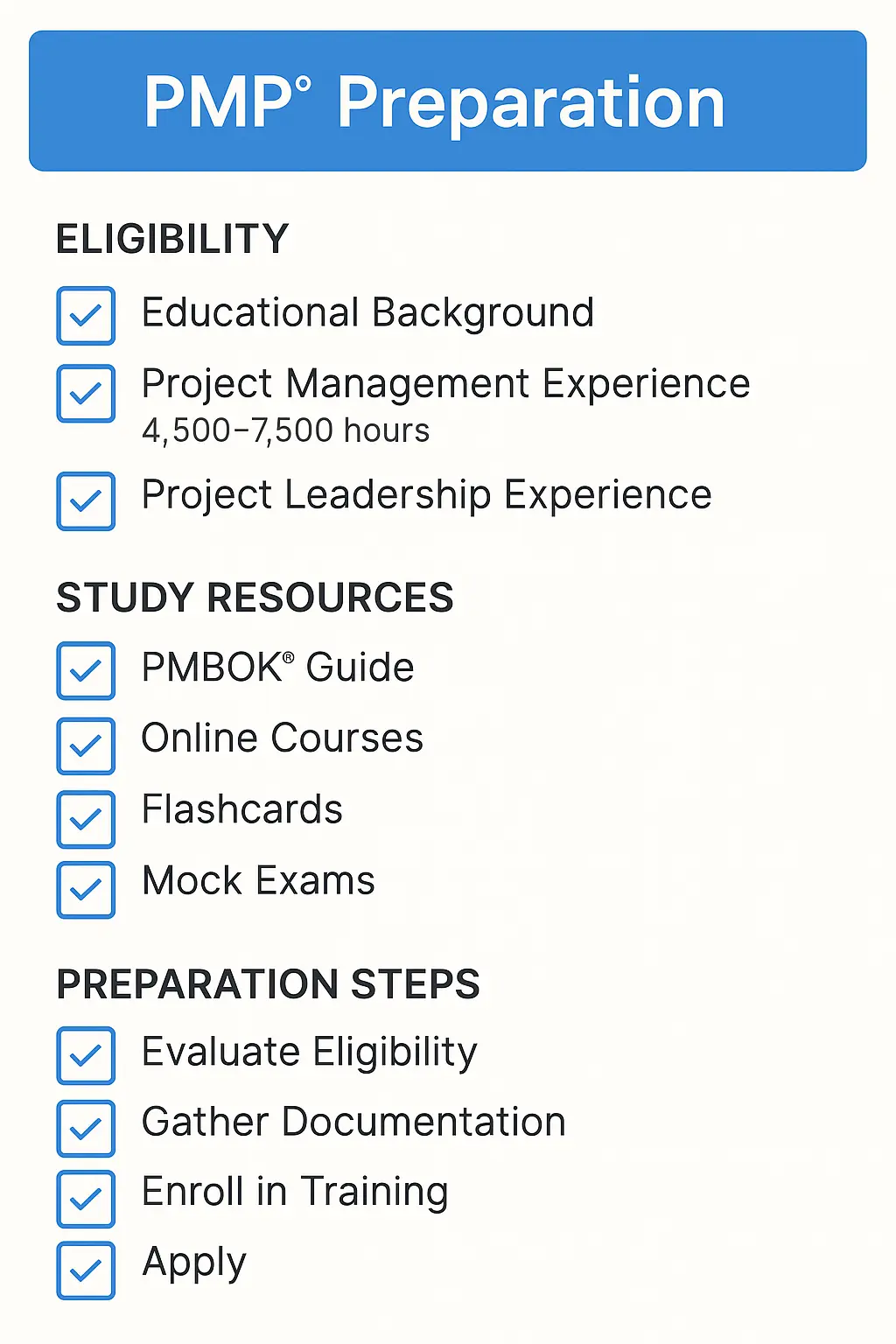
Understanding Eligibility Requirements
Before embarking on PMP® certification training, it’s essential to understand the eligibility criteria established by the
To qualify for the PMP® exam, candidates must meet one of the following experience and education requirements:
- Option 1: A four-year degree (bachelor’s or global equivalent) + 36 months (three years) of project management experience.
- Option 2: A high school diploma or associate degree + 60 months (five years) of project management experience.
Additionally, all candidates must complete one of the following:
- 35 hours of formal
project management education (such as a PMP® prep course). - Certified Associate in
Project Management (CAPM®) certification, which fulfills the educational requirement.
Meeting these requirements ensures that PMP®-certified professionals have hands-on experience in leading projects, making the certification highly respected across industries.
Best Study Resources for PMP® Preparation
Preparing for the PMP® exam requires strategic planning, high-quality study materials, and consistent practice. Since PMP® certification is based on real-world application rather than memorization, choosing the right resources can make a significant difference.
Here are some of the best study resources for PMP® exam preparation:
1. PMBOK® Guide (7th Edition)
The
2. PMP® Exam Prep Books
Many professionals find third-party exam prep books more digestible than the PMBOK® Guide. A top recommendation is:
- Rita Mulcahy’s PMP® Exam Prep – Known for its practical approach, scenario-based questions, and test-taking strategies, this book is widely used by PMP® candidates.
3. Online PMP® Courses
For those who prefer interactive learning, several online PMP® training options provide structured guidance for exam success:
- Udemy – Offers affordable, self-paced PMP® courses with practice tests.
- Coursera – Features university-backed PMP® training programs.
- PMI®’s Official Training – PMI® provides direct training programs, ensuring alignment with the latest exam format.
Wrapping Up: Taking the Next Step Toward Leadership

Earning your PMP® certification is more than just adding a credential to your resume—it’s a transformational journey that equips you with the skills, confidence, and strategic mindset needed to lead projects with excellence. By understanding project planning, risk management, stakeholder communication, leadership strategies, and maximizing project benefits, PMP®-certified professionals stand out as indispensable assets in their organizations.
If you’re ready to enhance your leadership abilities, improve project outcomes, and open doors to new career opportunities, now is the perfect time to start your PMP® training. A structured study plan, the right resources, and a commitment to continuous learning will set you up for success.
Take the First Step Today
Start by exploring professional training and certification programs to find the best path forward. Invest in your future and take the next step toward becoming a certified project leader who drives success in every project.
References PMP
Project Management Institute. (n.d.).
Project Management Institute. (n.d.). A Guide to the
Project Management Institute. (n.d.). Pulse of the Profession®: Beyond Agility. PMI®. https://www.pmi.org/learning/library/project-management-leadership-11337

